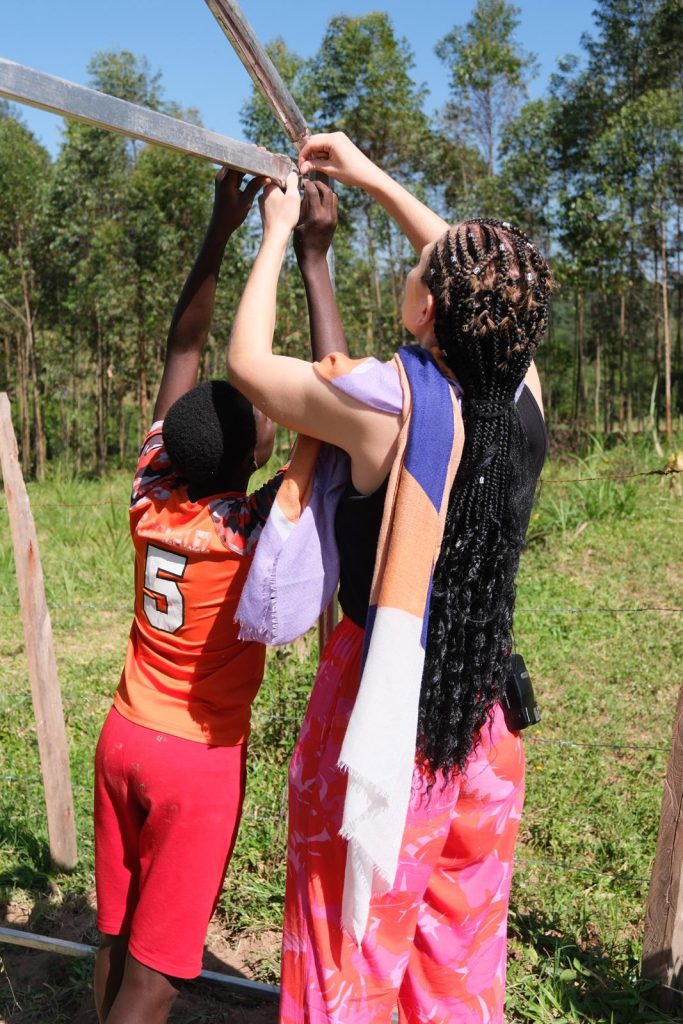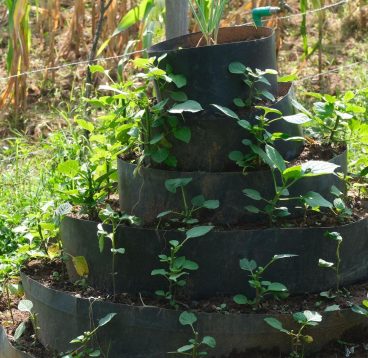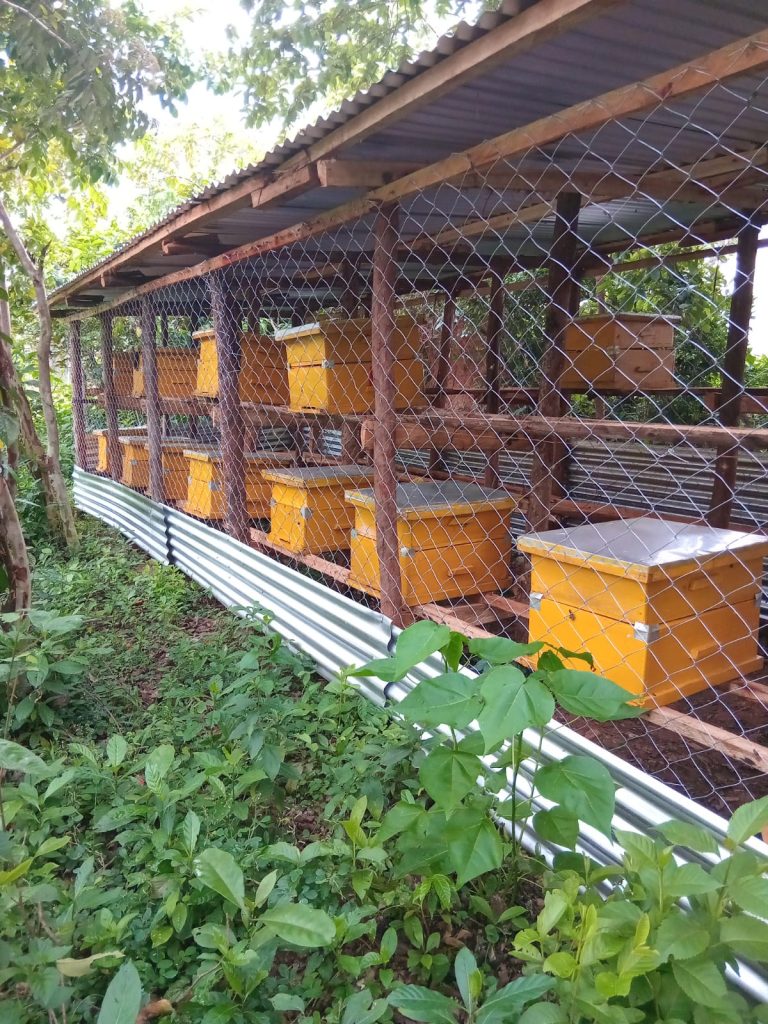Kampf gegen den Hunger
Food Security & Environmental Conservation
Ein Weg bauen zu natürlichen Nahrungsmitteln
Hunger ist für Millionen von Menschen in Kenia Alltag. Auch unser Projektstandort bildet da keine Ausnahme. Da Klimawandel, wirtschaftliche Herausforderungen und der eingeschränkte Zugang zu Ressourcen den Agrarsektor weiterhin stark belasten, haben viele Familien Schwierigkeiten, sich ausreichend zu ernähren.
Unser Projekt zielt darauf ab, das Gleichgewicht zwischen Landwirtschaft und Natur wiederherzustellen, indem als Beispiel einheimische Bäume in Anbausysteme integriert werden. Dadurch wird die Biodiversität erhöht, die Bodengesundheit verbessert und die Klimaresilienz lokaler Gemeinschaften gestärkt. Durch die Kombination von Agroforstwirtschaft mit modernen Anbaumethoden wie dem Gewächshausanbau, wollen wir die Ernährungssicherheit verbessern, die Produktivität steigern und nachhaltige Einkommensmöglichkeiten für Landwirte schaffen.
Our approach begins with engaging communities to understand their agricultural challenges. We identify suitable native tree species that can enhance soil fertility, reduce erosion, and support biodiversity while providing additional benefits such as fruits, timber, and medicinal resources. In collaboration with botanists and local experts, we’ve established a community nursery where these trees are propagated and grown.
Alongside tree-based farming systems, we have introduced greenhouse cultivation to further enhance agricultural productivity. In these greenhouses, farmers grow high-value crops like tomatoes and kales, protected from harsh weather conditions. This controlled environment allows for better management of pests and diseases, resulting in higher yields and year-round production. Greenhouse farming also reduces water usage through efficient irrigation systems, including water sourced from a newly drilled borehole at the village center.
Training programs empower farmers with agroforestry techniques like alley cropping, where trees are planted alongside crops to enrich the soil, and silvopasture, which integrates trees with livestock grazing areas. Additionally, workshops provide guidance on sustainable tree care, pruning, pest management, and soil conservation. For greenhouse operations, farmers are trained in crop rotation, pest control, and optimal irrigation methods to maximize productivity.
We also emphasize value addition by training farmers to sustainably harvest and process tree-based products such as fruits, seeds, and medicinal plants. Meanwhile, tomatoes and kales grown in greenhouses are marketed locally, improving access to fresh, healthy produce. Partnerships with local businesses, cooperatives, and government agencies help facilitate market access and create a strong support system for farmers.
Monitoring and evaluation are central to the project’s success. We track tree growth, soil improvements, and crop performance in both open fields and greenhouses. Soil tests help us measure increases in organic matter and nutrient levels, while crop yield data highlights the impact of sustainable practices on productivity and income. Farmer feedback informs ongoing adjustments, ensuring the approach remains effective and adaptable to local needs.
To sustain this progress, we promote community ownership through farmer cooperatives and continuous mentorship. Profits from both tree-based products and greenhouse crops are reinvested into nurseries and agroforestry programs. We are also exploring carbon credit initiatives and ecosystem service payments to provide additional long-term financial support.
The outcomes we envision are far-reaching. As agroforestry practices take root, soil fertility will improve, erosion will decrease, and biodiversity will flourish. Farmers will benefit from increased yields, stable incomes, and better food security. The integration of greenhouse farming will provide a consistent supply of vegetables, reducing vulnerability to climate impacts. By enhancing carbon sequestration and promoting sustainable agriculture, we are also making a meaningful contribution to global climate change mitigation.
We are pleased to share that our daycare project is currently benefiting from the use of greenhouse-grown products to supplement the children’s meals. This initiative not only enhances the nutritional value of the meals but also reduces food costs, promoting a healthier, more sustainable environment for the children.
In addition, we are planning to install beehives in the project’s small forest area. This will attract bees for honey production, which will serve as both an additional source of nutrition and a revenue stream. The honey produced will contribute to the long-term sustainability of the project by generating income, which can be reinvested to support the daycare’s ongoing operations and initiatives. This project exemplifies our commitment to self-reliance, sustainability, and improved well-being for the children and the wider community.
Ultimately, this project is about cultivating a sustainable future where agriculture and nature work in harmony. By integrating indigenous trees, modern greenhouses, and sustainable practices, we are empowering farmers to build resilient, thriving communities—where both people and the planet prosper together.



Bee Keeping Project
Beekeeping is more than honey production—it provides income, nutrition, and environmental benefits. Families earn from honey and other products like beeswax and propolis, which are always in demand. With minimal land and equipment required, it’s accessible even to low-income households. Income from honey helps pay for school fees, healthcare, and food.
Honey is also a natural, nutritious food with medicinal uses, supporting health where healthcare is limited. The practice empowers women and youth, as it is flexible and requires little physical labor.
Bees improve biodiversity by pollinating crops and wild plants, boosting harvests and food security. Communities also protect forests and plants to sustain bee colonies, promoting reforestation and sustainable land use.
This project combines economic empowerment with environmental protection—creating income, improving health, and strengthening ecosystems, making beekeeping a long-term solution for people and nature.
Agriculture Photo Gallery
Have we aroused your interest in volunteering? Then please contact us directly. We look forward to hearing from you. All further information will be discussed with you directly in person or over email.
